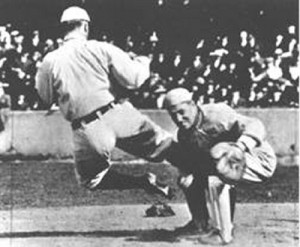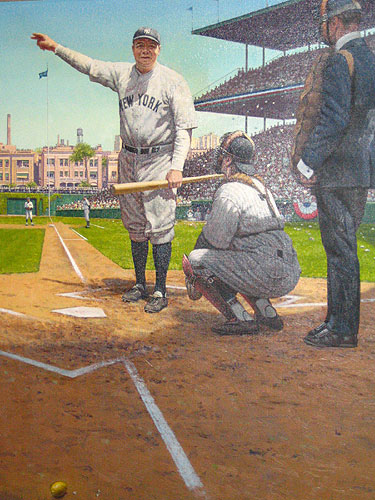Some things are immensely popular right before a steep decline, like cricket in America in 1900 or newspaper advertising in the 1990s. Just because you’re on top doesn’t mean you’re staying there. Baseball has never been more popular in America than it is now, as measured by ticket sales and television contracts, but something seems amiss. It’s no longer the national pastime; thanks to gambling, a taste for violence and a less-demanding schedule, the NFL reigns supreme. And there isn’t a star in baseball equal to Lebron James of the NBA.
From the moment of the Nelson Doubleday hokum, the sport was always sold on a lie. Myths were built, and that was unsustainable. It was never a rustic sport nor a clean one, but it was protected as such because it was considered too important to the national psyche. It was the present being sold as nostalgia, and that can’t work in a world of decentralized media.
But even before the PED scandals of the ’90s and aughts (which are largely silly and filled with hypocrisies) made it all come crashing down, baseball had lost traction with the popular culture, a sport that revered team before individual and humility before braggadocio, unless you were looking for a fastball behind your ear. These society-wide things are (probably) cyclical, and all you can do is better promote your stars.
Commissioner Bud Selig’s retirement is a positive, as his leadership has flagged on almost every important issue, from technology to padded caps for pitchers to stadium disputes. The rise of regional sports cable and its need for live content has provided the MLB with money to paper over Selig’s failings. Owners and players have never been richer, and there’s some danger in that. I have doubts that the next commissioner will be more progressive, but we can hope. So many kids and young adults having no interest in the sport is scary.
The other best thing that could happen to baseball would be to have its antitrust exemption stripped. There is no way for competition to arise under the current system. (To be fair, even without the exemption, it would be difficult to start a new league.) But perhaps a speed league that enforced rules to shorten games to two hours would force the MLB to change and grow. Good competition for the league is as important as good competition between the teams–maybe even more important in the big picture.
The opening of “Is It Game Over?” Jonathan Mahler’s recent New York Times essay:
 “MAJOR LEAGUE BASEBALL is doing just fine. Unlike the N.F.L. and the N.B.A., it has been free of labor strife for nearly 20 years. It has more exciting young stars than I can ever remember. It has even achieved that elusive ‘competitive balance,’ with seven different champions over the last decade. Teams across the country are playing in brand-new ballparks that they somehow persuaded local governments to help pay for. Over the last 20 years, baseball revenues have grown from roughly $1 billion to nearly $8 billion.
“MAJOR LEAGUE BASEBALL is doing just fine. Unlike the N.F.L. and the N.B.A., it has been free of labor strife for nearly 20 years. It has more exciting young stars than I can ever remember. It has even achieved that elusive ‘competitive balance,’ with seven different champions over the last decade. Teams across the country are playing in brand-new ballparks that they somehow persuaded local governments to help pay for. Over the last 20 years, baseball revenues have grown from roughly $1 billion to nearly $8 billion.
The game, in other words, has never been healthier. So why does it feel so irrelevant?
Maybe the best evidence of this admittedly unscientific observation is the national TV ratings. There’s no sense comparing baseball’s numbers to football’s, which exist in a whole other Nielsen’s stratosphere. But baseball is losing ground to pro basketball, too. In 2012, the N.B.A.’s regular season ratings on ABC were nearly double those of Major League Baseball on Fox. The last eight years have produced the seven least-watched World Series on record.
More to the point, baseball seems simply to have fallen out of the national conversation (unless the conversation happens to be about steroids, that is). The last time baseball felt front and center, culturally speaking, was the 1998 home-run race between Mark McGwire and Sammy Sosa. And we all know how that turned out.”
Tags: Bud Selig, Jonathan Mahler

